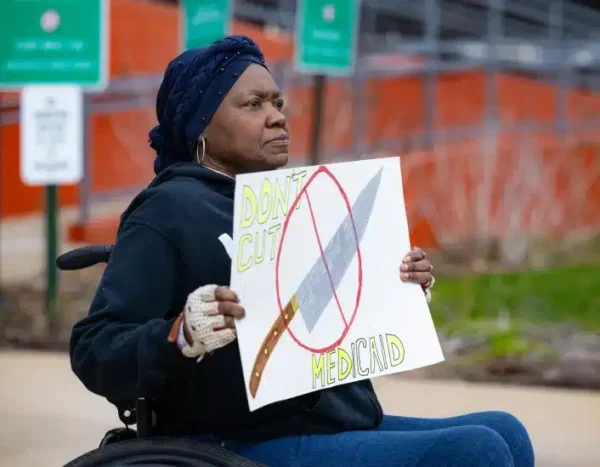
This story was originally published by Capital B Gary.
By Jenae Barnes
Capital B Gary
March 28, 2025
Pamela Johnson worries about what could happen to her grandson, Robin Johnson Singleton, if Medicaid is cut. Robin, who has Down syndrome, has been on Medicaid since birth. The nine-year-old is now in third grade and, thriving after several surgeries, relies on Medicaid for the care that keeps him healthy.
“I would think the people who are involved in doing this would want this for their own children?” Johnson said. “No, so they’re not thinking about ours. So we still have to use our voices. We cannot stop.”
Early Friday morning, Johnson joined a coalition of Northwest Indiana citizens, healthcare professionals, mental and behavioral health clinicians, disability rights organizations, elected officials, and activists in front of the Lake County Government Complex Building to share a simple but critical message: Medicaid Matters.
Medicaid, including Indiana’s Health Indiana Plan (HIP) provides healthcare coverage for eligible Hoosiers, including those with low incomes who cannot afford insurance, and those using behavioral health and mental health services.
However, advocates say that Senate Bill 2, which would include massive cuts to Medicaid funding and enrollment would leave more Hoosiers abandoned, especially those most vulnerable.
The public forum, hosted by Edgewater Health’s primary care and behavioral health center in Gary, drew dozens of people but represented a concern about a health threat to hundreds of thousands of Hoosiers dependent on Medicaid services.

SB2 would cut the increasing costs of Medicaid by decreasing enrollment, imposing work requirements, and increasing enrollee reporting to four times a year. It would also require a work status of at least 20 hours per week to receive access, and prohibits marketing Medicaid programs intended to decrease information about residents’ options.
Currently over 680,000 people are enrolled in Medicaid’s Health Indiana Plan. And more than 40% of Gary residents are insured by Medicaid, according to the U.S. Census Bureau. Initially, SB2 would’ve capped the program at 500,000, leaving about 250,000 people off health coverage access until it was recently amended. Still, elected officials say there is more work to be done.
“We do have some other issues, like having a check-in process, and having work requirements. Those have failed in other locations,” State Rep. Earl Harris Jr. said. “Why are we adding things to make the process harder? That should be something that we should be looking at and making easier.”
ChaKara Gunn, behavioral health manager for the city of Gary, spoke about the damaging impact the bill would have on mental and behavioral health services. For Gunn, whose job is to create a network for mental health services, cutting Medicaid would make it more complicated.
“This bill is a direct threat to mental health, to disability services, and to civilization as a whole,” Gunn said. “It’s my hope that they don’t pass it. It will be very detrimental to our community, specifically those that are in the rural areas and those that are underserved.”
Gunn emphasized that adding bureaucratic red tape of increased eligibility standards and quarterly recertification for Medicaid access will put vulnerable populations at even greater risk of losing their services, making it “almost impossible” to navigate the system, and will increase wait times for treatment.
For residents with disabilities, the cuts also pose risks to coverage.
“Cutting Medicaid is another way of erasing us,” said Leslie Hawker, a member of disability advocacy organization Everybody Counts. ”We have to be better than that. We have to be human.”
Danita Johnson-Woods, president and CEO of Edgewater Health, encouraged residents to speak out on the issue and contact the clinic for access to mental and behavioral health resources through their website and new phone number, 844-433-4392.
Jenae Barnes is Capital B Gary’s health and environment reporter. You can reach Jenae at jenae.barnes@capitalbnews.org.
Capital B is a Black-led, nonprofit local and national news organizations reporting for Black communities across the country.